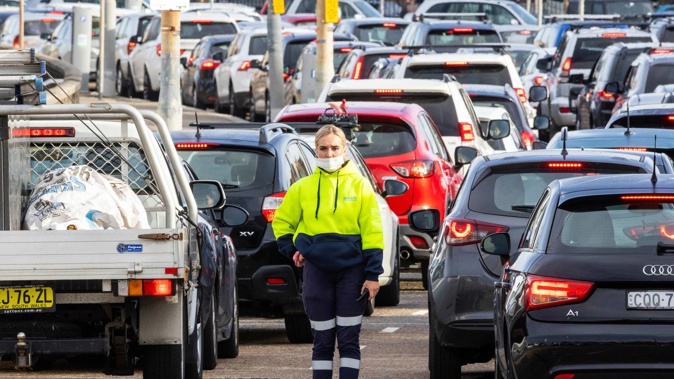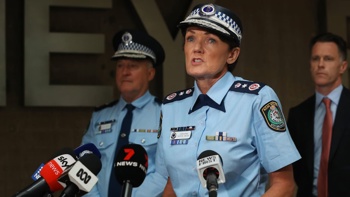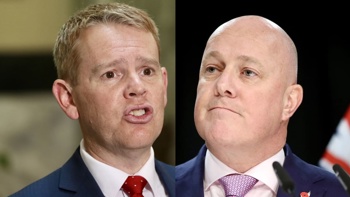
NSW has recorded its biggest rise in daily Covid-19 cases since this latest outbreak began, with 22 new locally acquired infections.
NSW Premier Gladys Berejiklian has announced large parts of Sydney are heading into a lockdown, with a stay-at-home order lasting until midnight next Friday.
These areas include Woollahra, Randwick, Waverley and the City of Sydney.
The lockdown will be enforced for the next week, and the existing measures have also been extended to midnight Friday.
"The reasons to leave home are if you have to go for work or education," said Berejiklian.
"Although we'd prefer you stay at home. If you need to exercise outside, no more than ten per group outside. And also, if you need to buy essential goods or services.
So please don't panic buy."
Ahead of the meeting, which is due to begin at 9.30am Australian time, Deputy Premier John Barilaro said a lockdown wasn't required based on the current advice.
"We look at the numbers, 11 cases does sound alarming [but only] one is a mystery case," he told Nine's Today.
"It is not just the numbers, it is the detail, the information we have behind the scenes that our expert health officials look at that gives us the confidence to make the decision and the advice at this stage is not to lock down.
"At this stage I don't think we need a lockdown. But that advice could change in the next few hours and it could change over the weekend."
Public health experts are divided on whether Sydney needs to impose a "short, sharp" lockdown.
Some have warned Sydneysiders are "sitting ducks" as the Delta variant spreads, but others argue the number of "mystery cases" does not yet warrant such drastic action.
The NSW Government has been criticised for resisting calls to lock down the city despite another rise in cases on Thursday, bringing the latest outbreak to 48.
Premier Berejiklian said it was "perhaps the scariest period" that the state had faced since the start of the pandemic due to the new Delta variant – but insisted that the tough restrictions announced on Wednesday were the "appropriate settings".
Asked whether NSW would consider a three-day lockdown, chief health officer Kerry Chant said that would not be "long enough".
"Three-day lockdowns don't work if you've got distributed disease," she said.
Chant said a three-day lockdown was used in situations "where you have a sudden surge of cases and you want everybody to stay in the same place, and that allows you to get any backlog of any contact tracing".
"We are not in that situation where we are not getting to people in terms of the contact tracing."
Sydney 'on a knife edge'
Professor Raina MacIntyre, head of the Biosecurity Research Program at UNSW's Kirby Institute, wrote in an opinion piece for the Sydney Morning Herald last night saying that Sydney was "on a knife edge of a Delta epidemic".
"We are sitting ducks, with a largely unvaccinated or partially vaccinated population.
"Lockdowns are a last resort but, like mask mandates, are most effective when used early. The purpose is to reduce contact between people [and therefore to reduce the opportunity for growth of the epidemic]."
MacIntyre argued that "waiting until the situation is out of control will require a much longer and more costly lockdown", and claimed "multiple studies have now shown that lockdowns actually protect the economy compared with out-of-control epidemics".
"Countries like Australia and New Zealand, which used stringent measures, fared better economically than most of Europe or the US in 2020," she wrote.
"If case numbers keep rising, a short, sharp lockdown combined with school holidays might be just the circuit breaker we need to ensure this outbreak does not escalate."
ABC health expert Dr Norman Swan, who earlier this week warned Sydney faced a "disastrous scenario" without a lockdown, agreed with MacIntyre's take, writing on Twitter that she had been "right about this pandemic from the beginning".
Appearing on the ABC's QandA on Thursday night, UNSW Professor Mary-Louise McLaws, who is an adviser to the World Health Organisation, and Adjunct Professor Bill Bowtell, a strategic health policy consultant with the university, also advocated for a lockdown.
"I think NSW is loath to use lockdowns," McClaws said.
"Mostly every other state does. I think this time they've had a very slow increase in numbers and a very high peak which is quite unusual for this variant of concern, but I still think that they should have gone into a sharp lockdown to stop people from wandering, particularly over the weekend."
Host Hamish Macdonald asked whether NSW had the latest outbreak under control.
"Well, no," she said.
"We've had several cases that are potentially causing more harm down in Melbourne. We have the hairdresser that has been a mystery link as they call it, then we've had the woman that went to New Zealand, so we're going to see more cases."
She said the cases "may not be enormous in number but that's beside the point".
"This is a variant of concern that has a reputation for causing more hospitalisation and of course more [transmission from] children because of the large numbers of people they can infect."
Bowtell agreed. "The Premier is right to say this is a very scary moment, but you can't have it both ways," he said.
"You can't say it's a scary moment and we must do all the things that we must do, testing and so on, and then think it's business as usual. We only have one weapon in our armoury unfortunately now that works, and that's, as Mary-Louise McLaws said, a short sharp lockdown."
Lockdown 'not justified'
But ANU infectious diseases expert Professor Peter Collignon said there were still not enough "mystery cases" at the moment to justify a lockdown.
"Should we lock down Sydney because we've got three mystery cases? I would think that isn't justified," he told news.com.au on Friday.
"It's not that lockdowns are not on the cards, but the rationale for a lockdown is having lots of cases in the community and particularly lots of mystery or unlinked ones. The real significance of that is for every person unlinked is another you haven't found yet still spreading infection."
He said the current restrictions already in place in Sydney were "significant".
"I actually think we're too black and white with the term lockdown.
"Even last April, Victoria allowed no visitors [in the home], NSW allowed one, most others two, South Australia 10 – all had the same result, they managed to control it. What we want is restrictions on people when there is Covid-19 in the community, but they need to be proportionate to the risk at the time."
Collignon predicted that the latest Sydney outbreak would peak over the next few days before fizzling out.
"All these clusters go for two to three weeks," he said.
"We'll see a peak over the next few days, 11, 12 cases [a day], then gradually it'll go down. What we'll find in the second half is just about everybody will be in isolation or quarantine."
Collignon added that as more of the population became vaccinated, Australia would have to follow the lead of Singapore in preparing people to live with Covid-19 like any other endemic disease.
The Straits Times reported earlier this week that Singapore's Government planned to stop giving "daily updates on infection numbers", and would "shift to focus on outcomes, such as how many patients fall very sick and end up needing intensive care, the same way the flu is monitored".
"My view is we'll need to do that too," Collignon said.
Singapore is tying the shift to this "new normal" to certain vaccination milestones. By early next month, two-thirds of the population will have received two doses of a vaccine.
Australia has administered just under seven million vaccine doses.
An estimated 30 per cent of the population have had one dose, but only 3.7 per cent have had two, according to the Covid Live website.
Collignon said Australia should make a similar shift once 70 to 80 per cent of adults were vaccinated, and potentially 80 to 90 per cent of over-70s, because "that's where 90 per cent of the deaths occur".
"Look at Melbourne – if over-70s were vaccinated, instead of 800 deaths they would have had 60," he said.
"That's still not good, but every year there are thousands of deaths from influenza and the common cold."
- text by Frank Chung
Take your Radio, Podcasts and Music with you









